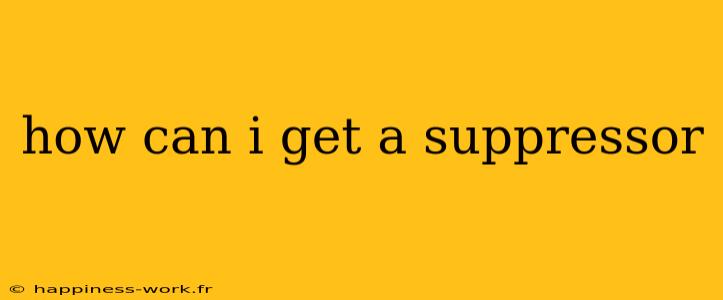Acquiring a suppressor can be a complex process due to the legal requirements and regulations involved. In this article, we will break down the steps you need to take, the considerations involved, and additional information to help you make an informed decision.
Understanding Suppressors
What is a Suppressor?
A suppressor, also known as a silencer, is a device attached to the muzzle of a firearm to reduce noise, muzzle flash, and recoil. Contrary to popular belief, suppressors do not make firearms completely silent but significantly decrease the sound level, making shooting more discreet and reducing noise pollution.
Step-by-Step Process to Acquire a Suppressor
1. Check Local Laws and Regulations
Before purchasing a suppressor, it's critical to understand the laws in your area. Suppressor legality varies by state and even by municipality. Consult resources like the National Rifle Association (NRA) or your local gun shop for specific legal information.
2. Determine Your Eligibility
To purchase a suppressor in the United States, you must meet certain eligibility criteria:
- Be at least 21 years old to purchase a suppressor from a dealer (18 years old if acquiring one from an individual).
- Be a U.S. citizen or legal resident.
- Have no felony convictions or disqualifying mental health issues.
3. Choose a Reputable Dealer
It's essential to work with a licensed firearms dealer who specializes in suppressors. Research dealers in your area, read reviews, and ensure they have a good reputation. You can find qualified dealers through organizations such as the American Suppressor Association.
4. Select Your Suppressor
Suppressors come in various sizes and calibers, so it's important to choose one that fits your firearm and intended use. Consider factors such as:
- Material: Aluminum vs. stainless steel
- Caliber Compatibility: Ensure the suppressor matches your firearm's caliber
- Sound Reduction Level: Different suppressors offer varying degrees of noise reduction
5. Fill Out the ATF Form 4
To legally purchase a suppressor, you must submit an Application for Tax Paid Transfer and Registration of Firearm (ATF Form 4) to the Bureau of Alcohol, Tobacco, Firearms and Explosives (ATF). The application requires:
- Personal information
- Details about the suppressor
- Fingerprints and passport-sized photos
6. Pay the Transfer Tax
A $200 tax is required for transferring a suppressor, which is a one-time fee. This tax goes to the federal government and is non-refundable.
7. Wait for Approval
After submitting your application, you can expect to wait several months for ATF approval. This waiting period can range from 6 months to a year or more, depending on processing times.
8. Pick Up Your Suppressor
Once your application is approved, you'll receive a tax stamp that allows you to pick up your suppressor from the dealer. Be sure to bring the necessary identification.
Additional Considerations
Understanding NFA Trusts
Many gun owners opt to use a National Firearms Act (NFA) trust to acquire suppressors. An NFA trust allows multiple people to use the suppressor legally and can simplify the transfer process in the future. However, establishing a trust requires legal knowledge and possibly hiring an attorney.
Why Own a Suppressor?
Owning a suppressor has numerous benefits, including:
- Hearing Protection: Reducing noise can help prevent hearing damage.
- Reduced Noise Pollution: Suppressors contribute to quieter shooting practices, minimizing disturbances in residential areas.
- Improved Shooting Experience: Suppressors can improve accuracy by minimizing recoil and improving stability.
Conclusion
Getting a suppressor is a multifaceted process that requires understanding and navigating legal regulations. By following the steps outlined in this guide and ensuring compliance with local and federal laws, you can acquire a suppressor responsibly. Remember to continually educate yourself and consult legal experts if necessary.
This article references information from WikiHow and its contributors, ensuring that the guidance provided is both accurate and reliable.
Additional Resources for Further Learning
- NRA Basics of Shooting
- American Suppressor Association
- Bureau of Alcohol, Tobacco, Firearms and Explosives (ATF)
By understanding the requirements and the responsible use of suppressors, you can enhance your shooting experience while maintaining compliance with the law.
